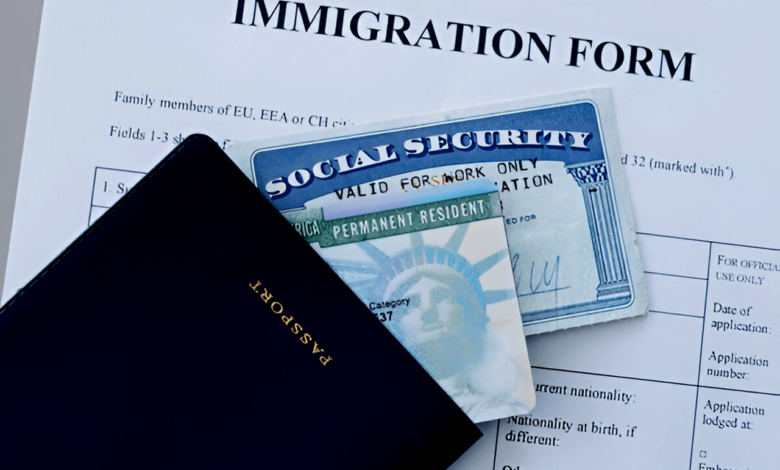Green Card Through Marriage New York Legal Checklist for 2025
Green Card through marriage in New York Get the 2025 legal checklist for documents interviews & approval tips.

Securing a Green Card through marriage is one of the most common ways for foreign nationals to obtain permanent residency in the United States, especially in a diverse state like New York. However, the process involves strict legal requirements, thorough documentation, and careful adherence to U.S. Citizenship and Immigration Services (USCIS) guidelines. For couples navigating this process in 2025, understanding the latest updates, filing procedures, and New York-specific considerations is essential to avoid delays or denials. This comprehensive guide provides a step-by-step checklist to help spouses successfully apply for a marriage-based Green Card while ensuring compliance with immigration laws.
New York’s high volume of immigration cases means processing times and requirements may differ from other states, making proper preparation crucial. Whether you’re a U.S. citizen sponsoring your spouse or a Green Card holder petitioning for your partner, this article outlines the latest 2025 filing procedures, required forms, interview tips, and common pitfalls to avoid. By following this New York legal checklist, couples can strengthen their application and move closer to achieving their goal of permanent residency together.
Green Card Through Marriage New York Legal Checklist for 2025
Sponsor’s Immigration Status
The sponsoring spouse’s immigration status is a fundamental requirement for a marriage-based green card application, as they must be either a U.S. citizen or a lawful permanent resident (Green Card holder) to qualify. If the sponsor is a U.S. citizen, their foreign spouse is classified as an “immediate relative,” which offers significant advantages including no annual visa caps and generally faster processing times of approximately 12-18 months. However, if the sponsor is a Green Card holder rather than a citizen, the foreign spouse falls under the “family preference” category (specifically the F2A visa classification), which is subject to annual numerical limits and often results in waiting periods of two years or more before a visa becomes available.
Valid and Bona Fide Marriage
For a marriage to qualify for a green card application, it must satisfy two essential requirements: legal validity and authenticity. First, the union must be legally recognized, whether performed in the United States or abroad – New York law recognizes both opposite-sex and same-sex marriages, though international marriages must comply with the laws of the country where they were solemnized. More importantly, USCIS requires convincing evidence that the marriage represents a genuine, loving relationship rather than an immigration arrangement.
Step-by-Step Application Process
Filing Form I-130
The first step is submitting Form I-130, which establishes the marital relationship. U.S. citizens or Green Card holders must file this petition with USCIS, along with supporting documents such as a marriage certificate, proof of the sponsor’s citizenship or residency, and evidence of a bona fide marriage (joint bank accounts, lease agreements, photos, etc.).
Filing Form I-485
If the foreign spouse is already in the U.S. legally, they may concurrently file Form I-485 to adjust their status to permanent resident. This form requires additional documentation, including medical examination results (Form I-693), financial proof (Affidavit of Support, Form I-864), and the applicant’s immigration history.
Biometrics Appointment
After USCIS accepts the forms, the applicant will receive a notice for a biometrics appointment at a local Application Support Center (ASC). Fingerprints, photos, and signatures are collected for background checks.
Interview Preparation
USCIS schedules an interview at a local field office (such as the New York City or Albany offices). Both spouses must attend and answer questions about their relationship. Officers may ask about daily life, future plans, or personal details to verify the marriage’s authenticity.
Final Decision and Green Card Approval
If approved, the foreign spouse receives their Green Card in the mail. Conditional residency (a 2-year Green Card) is granted if the marriage is less than two years old at approval. After two years, the couple must file Form I-751 to remove conditions.
New York-Specific Considerations
New York’s high volume of immigration cases means processing times may vary. Couples should file at the correct USCIS lockbox and monitor case status online. Additionally, New York offers legal aid organizations that assist low-income applicants, such as the New York Immigration Coalition and Legal Aid Society.
Common Reasons for Denials and How to Avoid Them
Insufficient Evidence of a Bona Fide Marriage
USCIS maintains strict scrutiny of marriage-based green card applications to identify potential fraud, making it critical to provide comprehensive evidence demonstrating your marital relationship is authentic. To satisfy this requirement, couples should assemble a robust collection of documentation that collectively paints a picture of a shared life, including legally binding joint commitments like lease agreements, mortgage documents, utility bills, and shared financial accounts (banking, credit cards, loans, and insurance policies).
Financial Sponsorship Issues
Financial sponsorship requirements present a critical hurdle in marriage-based green card applications, as USCIS mandates the sponsoring spouse demonstrate the ability to financially support their partner at 125% of the federal poverty guidelines. Many applications face denial when sponsors fail to meet income thresholds, though this can be resolved by enlisting a qualified joint sponsor – typically a U.S. citizen or permanent resident willing to assume financial responsibility. Equally problematic are documentation errors; applicants must submit complete, accurate financial records including recent tax returns (preferably IRS transcripts), W-2 forms, and current pay stubs, with self-employed sponsors facing additional scrutiny requiring business licenses, profit/loss statements, and bank records.
Read More: Work-Life Balance: Making Health a Priority in a Busy World
Conclusion
Successfully obtaining a Green Card through marriage in New York requires careful attention to detail, thorough documentation, and patience throughout the USCIS process. By following the 2025 legal checklist from properly filing Form I-130 and Form I-485 to preparing for the marriage interview couples can significantly improve their chances of approval. Staying informed about the latest USCIS updates and seeking legal guidance when needed can help avoid common mistakes that lead to delays or denials. Supplementing these with personal evidence strengthens your case – include dated photographs showing you together in various settings and stages of your relationship, travel tickets and itineraries from trips taken as a couple, and samples of ongoing communication (such as text messages, emails, and social media interactions) that illustrate your relationship’s development over time.
For couples navigating the marriage-based Green Card process in New York, preparation is key. Gathering strong evidence of a bona fide marriage, meeting financial requirements, and understanding state-specific processing times will help streamline the application. While the journey may seem complex, the reward of permanent residency makes the effort worthwhile. With the right approach and resources, spouses can confidently move forward in building their lives together in the United States.
FAQs
How long does it take to get a marriage-based Green Card in New York?
Processing times vary, but immediate relatives of U.S. citizens typically wait 12-24 months, while spouses of Green Card holders may face longer delays.
Can we apply if my spouse entered the U.S. illegally?
It’s complex; consult an immigration attorney to explore possible waivers or alternative pathways.
What happens if our marriage is less than 2 years old at approval?
The foreign spouse receives a conditional Green Card and must file Form I-751 within 90 days before expiration.
Do we need a lawyer for the process?
While not mandatory, a lawyer can help avoid mistakes, especially in complicated cases.
What if our application is denied?
You may appeal or refile, depending on the reason for denial. Legal counsel is recommended.











